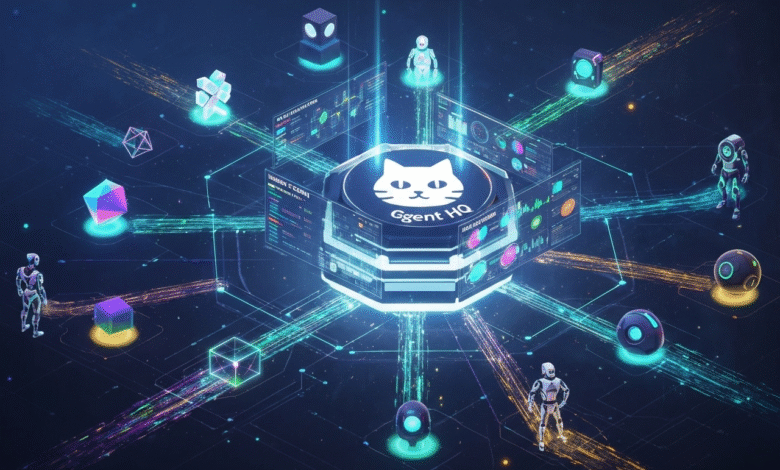Your Central Hub for All Coding Agents

▼ Summary
– GitHub has launched Agent HQ, a platform re-architecture that serves as a neutral control tower for managing multiple coding agents with full traceability and supervision.
– Agent HQ integrates agent orchestration directly into GitHub’s existing workflows, such as issues and pull requests, to maintain permissions and audit trails without disruption.
– The centerpiece is Mission Control, a unified interface allowing developers to monitor, assign tasks, and review agent activity across GitHub, VS Code, and other tools in real time.
– VS Code enhancements include Plan Mode for step-by-step feature planning and Custom Agents via AGENTS.md files, enabling tailored agent behavior without repetitive prompting.
– Agent HQ emphasizes governance with features like code quality checks, usage dashboards, and an AI Control Plane, addressing enterprise needs for security, auditability, and compliance.
GitHub has launched Agent HQ, a transformative platform designed to become the central command center for managing all coding agents, not just its own Copilot system. This strategic re-architecture aims to provide developers with a single, governed environment for overseeing AI assistants, offering complete traceability for every piece of code generated and the reasoning behind it. The initiative represents GitHub’s major bet on a future where developers orchestrate teams of specialized AI agents.
With a community exceeding 180 million developers and AI becoming a fundamental part of the software creation process, GitHub is positioning itself at the forefront of this shift. The company envisions a development landscape where engineers manage fleets of intelligent assistants rather than dealing with isolated chatbots or individual extensions.
GitHub’s Chief Operating Officer, Kyle Daigle, emphasized the practical focus of this new direction. He stated that Agent HQ moves beyond the buzzwords to address the real challenges of software delivery. The goal is to eliminate the inefficiencies often associated with AI tools, such as constant context-switching and the need to repeatedly explain tasks.
Fundamentally, Agent HQ repositions GitHub as a platform of platforms. It creates a unified, controlled workspace where various autonomous agents can operate, work together, and be held accountable. This ecosystem will include GitHub’s own Copilot Coding Agent, alongside upcoming integrations from major players like Anthropic (Claude), OpenAI (Codex), Google, Cognition, and xAI. Access to these agents will be available through a developer’s existing paid Copilot subscription.
Instead of attaching agents as separate add-ons, GitHub has woven agent orchestration directly into the established GitHub Flow. This means core processes like managing issues, branches, and pull requests continue uninterrupted, with existing permissions and audit trails fully preserved.
The cornerstone of this system is Mission Control, a unified command interface that provides a single view across every active agent session. This dashboard follows developers wherever they work—on GitHub.com, in VS Code, through the command line, or even on mobile. From this central hub, developers can assign new tasks, monitor real-time progress, and review the results produced by their agents.
Administrators can assign distinct identities to each agent, define limited permissions, and set granular controls for actions like triggering CI pipelines or security scans. GitHub has also introduced tools specifically for agent-generated code, including one-click merge-conflict resolution and enhanced comment and review features.
To ensure AI-driven work remains integrated with daily operations, teams can manage agent-related tasks directly from their usual communication and project management tools, such as Slack, Microsoft Teams, Jira, and others.
A significant part of this rollout involves deep integration with Visual Studio Code, which GitHub now designates as its flagship editor. The latest VS Code release introduces powerful new workflows. Plan Mode allows developers to collaborate with Copilot to draft a detailed, step-by-step plan for a feature or bug fix. Copilot assists by asking clarifying questions and identifying gaps before converting the approved plan into executable work.
Teams can now create AGENTS.md files, which are source-controlled configuration documents. These files specify prompts, tools, and rules, such as mandating table-driven tests for all handlers, which shapes Copilot’s behavior without the need for repetitive instructions.
VS Code now offers full support for the Model Context Protocol (MCP) specification and includes the new GitHub MCP Registry. This allows developers to install vetted MCP servers from providers like Stripe or Figma with a single click, granting agents direct, policy-controlled access to specialized APIs.
OpenAI’s Codex is the first third-party agent to become available within this new framework. Copilot Pro Plus users on VS Code Insiders can now use Codex natively inside GitHub workflows. This model is particularly tuned for handling long-running, parallel tasks, with some engineers reporting its use for complex refactoring work spanning dozens of hours.
An OpenAI product lead commented on the collaboration, noting that the goal is to meet developers in their existing workflows. An executive from Anthropic similarly expressed enthusiasm, explaining that with Agent HQ, Claude can function as a true collaborator, picking up issues, creating branches, and committing code.
For enterprise adoption, GitHub knows that confidence and control are just as important as raw speed. To address this, Agent HQ is built on three new governance pillars. A Code Quality feature, currently in public preview, expands Copilot’s checks to measure the impact on maintainability, reliability, and test coverage for each pull request. The Copilot Metrics Dashboard provides IT leaders with clear visibility into usage and return on investment. The AI Control Plane is a unified console where administrators can set security policies, manage model access, and enable comprehensive audit logging.
Support for self-hosted runners means that even heavily regulated enterprises can run agent workloads within their own Azure, AWS, or on-premises environments. This is crucial for complying with strict governance frameworks like APRA CPS 234 or ISO 27001.
This development is particularly significant for Australian developers and CIOs in sectors like public services and finance, where AI adoption is accelerating but governance remains a top priority. The accountability and transparency built into Agent HQ’s control plane directly address the standards set by local regulatory bodies.
Major Australian enterprise customers, including several large banks, can now allow their developers to experiment with Copilot and third-party agents while maintaining full control over telemetry, code review, and data residency. Independent developers and startups also gain access to this powerful orchestration stack through early updates in VS Code Insiders.
A GitHub executive confirmed that the platform now hosts over two million Australian developers and revealed that the Commonwealth Bank was the first organization globally to use GitHub’s coding agent.
The introduction of Agent HQ marks a philosophical shift in the role of AI in software development. The vision is no longer about AI simply writing code, but about AI working collaboratively with developers. Engineers are positioned as conductors of an intelligent, auditable orchestra of agents.
By anchoring agents within the fundamental primitives of GitHub—Git, Issues, Pull Requests—the platform maintains trust and traceability while integrating the best innovations from across the industry. It establishes GitHub as a neutral ground where various AI providers can plug in and collaborate.
For GitHub, this strategy offers insulation from the volatility of competing AI models. For developers, it promises a future with fewer disjointed tools and browser tabs, where AI finally begins to reduce complexity rather than adding to it. GitHub is not merely chasing the latest trend; it is building a systematic, governed foundation for the next era of software engineering: the age of agentic development.
(Source: ITWire Australia)




